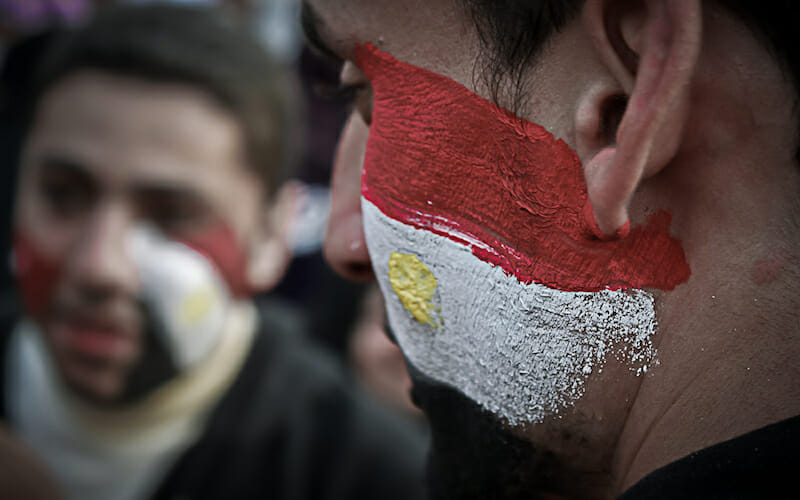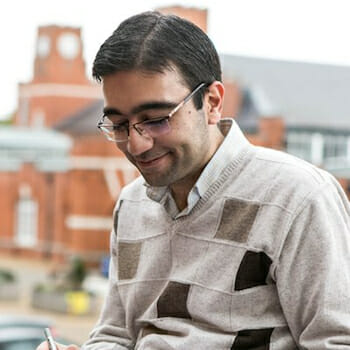
Stability has Replaced Democracy as a Popular Demand in Egypt: Q&A with Sarah Magdy
The March 2018 presidential election in Egypt decided that the incumbent Abdel Fattah el-Sisi will be in office for another four years. Many human rights groups, critics and journalists described the poll as “farcical,” saying that Sisi cannot be the true representation of Egyptian democracy.
Abdel Fattah el-Sisi had no serious rivals but only a mid-ranking politician who was himself a Sisi supporter. Moussa Moustafa Moussa was able to win no more than of 2.92% of the votes. The Civil Democratic Movement boycotted the election and there were allegations of electoral fraud.
Nezar AlSayyad, an Egyptian historian and the former head of the Center for Middle Eastern Studies at the University of California-Berkeley described the polls “a show” and the political landscape was described by the media and observers as characterised by widespread crackdown on opposition, interference by the military in civilian affairs and renewed calls for thousands of political prisoners to be released.
A young Egyptian journalist believes “stability” has replaced “democracy” as a popular demand in Egypt, saying that those familiar with the political situation in this country were aware that the presidential elections would be nothing but a “charade.”
Sarah Magdy, a journalism graduate from the University of Kent who currently works with BBC News as a freelancer says the Egyptians have come to realise that democracy isn’t a top priority for them anymore as it is a “western value” and there are other important things, including combating terrorism, achieving economic and political stability and education, which should be given importance.
I had the opportunity to interview Sarah Magdy, a lecturer at the Modern Sciences and Arts University in Cairo, to discuss the outcome of the recent presidential election and the future of democracy in Egypt six years after the January 25 revolution.
What’s your assessment of the process and outcome of the 2018 presidential election in Egypt? 14 human rights groups said the polls were “farcical” and that authorities had “trampled over even the minimum requirements for free and fair elections.” The incumbent President Abdel Fattah el-Sisi won 97.11% of the vote and his only challenger garnered no more than 641,000 votes. Was this what you expected to be the case before people went to polls?
Well, we were fully aware that the presidential election this year would be no more than a charade. There was only one candidate competing against the incumbent current president Abdel Fattah el-Sisi in the so-called presidential race while other competitors were either arrested or intimidated before the commencement of the election process. El-Sisi’s sole competitor Moussa Moustafa Moussa, is an obscure politician who leads Al-Ghad pro-government political party. Moussa has a long history of supporting el-Sisi. He launched two campaigns calling on el-Sisi to run for the presidency; one in 2014 called “Kamel Gemilak” (finish your favour) and another in 2016 dubbed Moayedoon (The Supporters).
Ironically, when Moussa decided to run for the presidency, he never changed his Facebook cover photo that had a pro-Sisi banner. So, I would say yes the results were expected and I personally anticipated a return to the striking 99.9% results – like the old days of Mubarak.
With an army general being president in Egypt for another four years, do you think the Egyptian democracy is heading to the right direction, as expected by those who started and upheld the January 25 revolution?
Frankly speaking, “democracy” isn’t a top priority for the Egyptian people now. They eventually came to a realisation that democracy is a western value, which comes after combating terrorism, achieving economic and political stability and educating the public. Thanks to the turmoil that occurred in the region after the Arab Spring and the Egyptian media’s systematic propaganda, stability has replaced democracy as a popular demand and hence, the army is being hailed for saving the country from falling into the grip of terrorist and militia groups as in the cases of Libyan or Syria. Not to mention, the youths who ignited the flames of the revolution are either suppressed behind the bars or have left the country to search for democracy somewhere else.
With all the ups and downs of the recent years, Egypt is still a highly-corrupt government. The Corruption Perceptions Index 2017 puts the country 117th internationally, sharing the same rank with Ecuador, Gabon, Pakistan and Togo. Are you optimistic about more transparency in governance and increased civil liberties for the Egyptian people?
Egypt announced that it’s taking actions to empower its institutions in the fight against corruption. Such efforts are critical as the country seeks to bring the issue of corruption to the fore and develop effective tools within a strong anti-corruption framework. President el-Sisi recently vowed that the state is committed to its “war on corruption” and every couple of days we read in the papers that a prominent figure is being held accountable or questioned in a corruption case. Egypt is working remarkably hard to refute Transparency International’s argument that “Egypt is suffering from corruption due to the absence of a real political will to fight it.”
Talking points about General Sisi are that he is a dictator, doesn’t tolerate different opinions and it’s only his power greed that makes him loyal to his chair in the Heliospolis Palace. What’s your take on that? If he’s so unpopular, then how do you interpret +21 million votes in the recent polls?
Sisi is seen as Egypt’s strongman and warrior. No one can claim that he is unpopular. A significant number of the Egyptian population wholeheartedly believes in him and his vision to build the country and restore stability. The Egyptian president has started many mega projects since he took office in 2014 like The New Suez Canal, the New Administrative Capital, building new roads, fisheries and various agricultural projects. He’s also been addressing pressing social and cultural issues like gender inequality and the social integration of the disabled people to gain more popularity. For the first time in the nation’s history, we have six female ministers, representing 20% of the cabinet. And again, Egyptians would rather have a strong man from a military background than a democratic civilian president, which makes el-Sisi the perfect man for that political stage.
How do you see the future of talented Egyptian youths who are running small enterprises, media, industries, start-ups and charities at home and abroad and don’t want to be choked in the power game of Sisi and his detractors?
Egyptian entrepreneurs are the real future of this country. We have thousands of brilliant minds who come up with new creative ideas every day. If only they can get the support required, I see entrepreneurship as our fast forward track to development.

